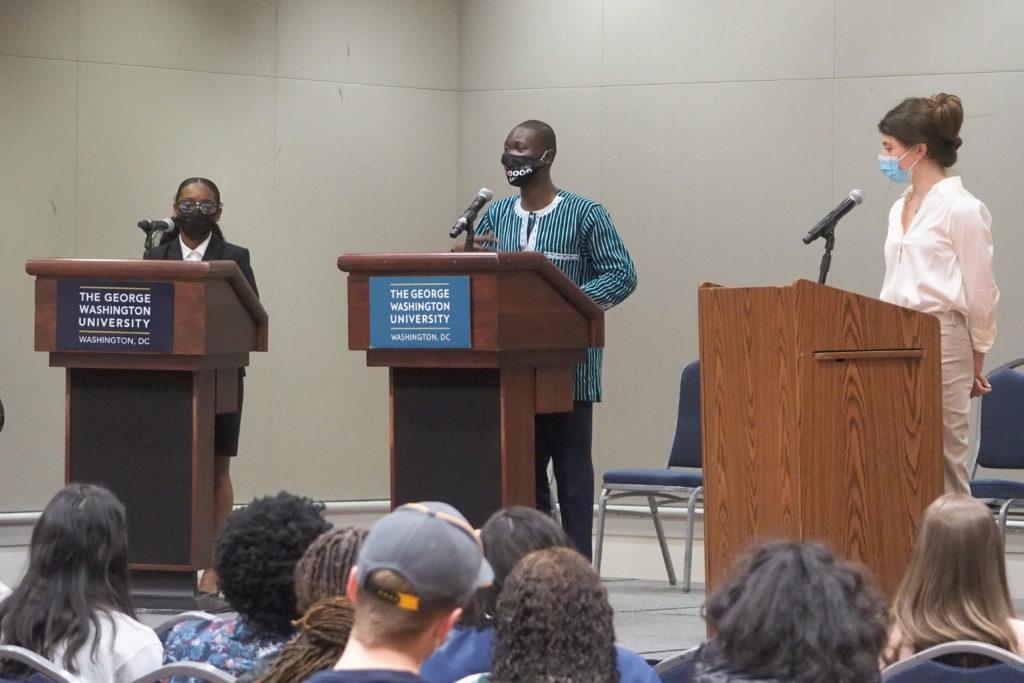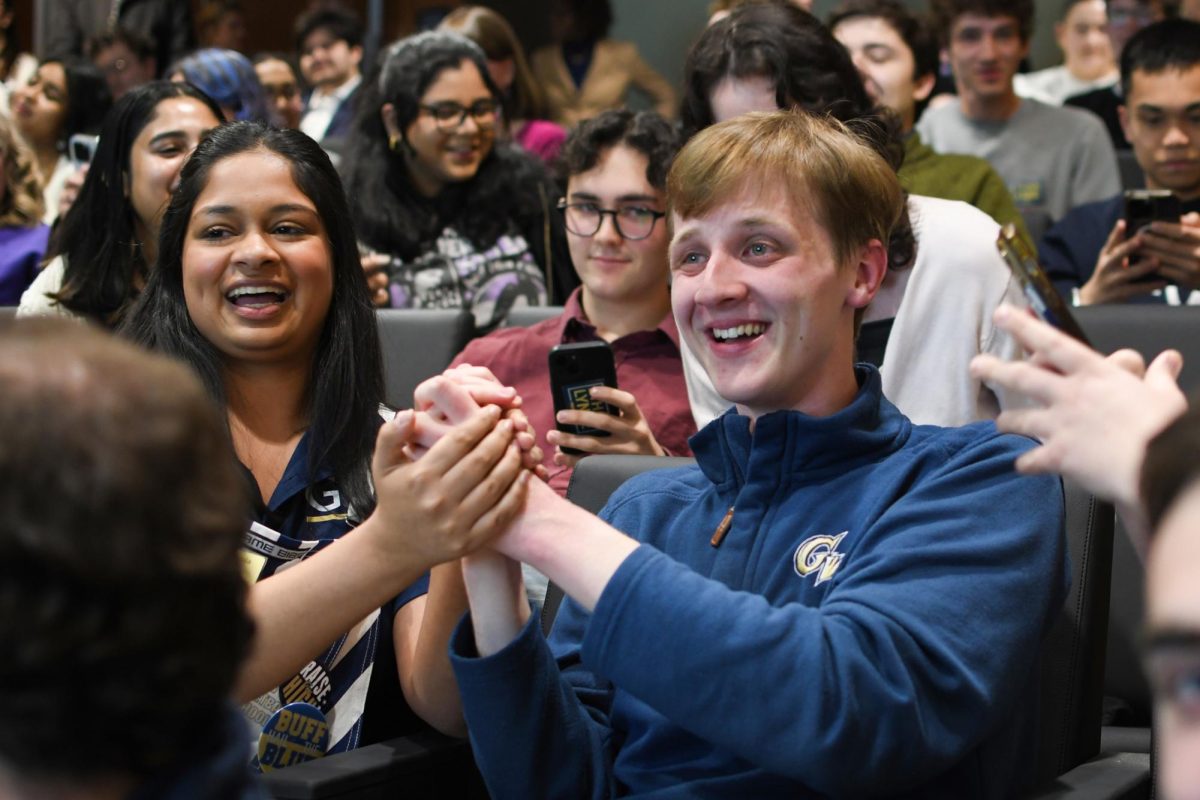As students returned to campus after winter break, Student Association candidates and their campaign teams started to prepare for the first fully in-person election season in three years.
The 2020 SA election season was cut short as the onset of the pandemic forced students off campus ahead of spring break and candidates switched their campaign strategies to virtual formats. But now SA campaign teams and candidates say they are ready for election day despite a slow start to announcing their candidacies and participation in traditional campaign events, like the SA’s annual postering day.
Sophomore Fatima Konte, a campaign staffer for SA presidential candidate Dasia Bandy, said she meets with Bandy almost daily to prepare for endorsement meetings and discuss new strategies to gain student support. She said campaign staff set up a texting hotline for students to air their criticism of the SA, in line with Bandy’s key platform point of increasing transparency within the SA.
Bandy was the first to announce her bid for president last month, and she would become the SA’s first Black female president if elected. Konte said the campaign recruited 15 of Bandy’s friends with different majors to represent students beyond political science and international affairs, who she said tend to be the most involved in the SA.
Konte said she focuses on strategic planning while other staffers focus on social media and public relations, but roles tend to be shared to increase efficiency.
“It’s important that you listen to them because at the end of the day, it really isn’t a popularity contest,” Konte said. “There’s a job that needs to be done, and someone has to do it. And I think Dasia is going to be that person.”
Konte – who met Bandy when the two worked as orientation leaders in the fall – said she compiled a list of student concerns, including GWireless issues and a lack of affordable dining, while collecting signatures for the campaign. She said with those concerns outlined, the campaign would help hold Bandy accountable for creating visible change within the SA and keep track of the progress of her goals if she is elected.
“The hope is to win, but not a superficial and shallow win,” Konte said. “I think that’s why it’s so important that you should have a lot of members on the team, because it’s important that once you get to the position, you stick to your word.”
But a number of candidates broke from SA election season tradition, opting to run without a team of campaign staff members to help field student feedback, plaster posters around Foggy Bottom and develop platform points to rally votes for the election. Only one senate race – the three undergraduate senate seats for the Elliot School of International Affairs – is contested this year.
SA Sen. Lydia Miller, ESIA-U who is running for reelection, said she has no official campaign staff instead of turning to friends and current SA members to help her learn the Joint Election Commission’s rules of running an SA campaign. Miller, the only freshman on the SA Senate, was appointed as a senator in October after a resignation opened up a seat.
She said running a campaign without a staff has been smooth because her peers have offered advice on campaign methods that appeal to students, like introducing herself to students in person through her classes.
“I can’t reach the entire Elliott School because I am only a freshman,” Miller said. “But because of the connections that I have, I’m able to reach a much wider audience either directly or through flyering and postering.”
Miller said she designed posters over spring break to put up around the University Student Center, District House and the Elliott School, planning to put up 20 flyers total.
Miller said if elected, she will connect the SA with groups like international students during global crises, like the Russian invasion of Ukraine. She said her positions in the GW community as a Ukrainian-American and member of the Navy ROTC help her advocate for underrepresented students at the University and the policies that they need.
“I just want to make sure that there’s a strong community feel, especially in D.C. because some people might not feel like we’re in college and on a college campus, but I want you to feel like you’re on a college campus,” Miller said.
Sophomore Henry Deng, a candidate for an undergraduate Columbian College of Arts and Sciences senate seat and a Hatchet opinions writer, said he is also running without any campaign staff. He said he receives sufficient support from his friends who offer feedback on how to campaign and spread messaging.
He said he will host question and answer sessions on his social media accounts to engage with students before election day. His campaign Instagram page has five posts, including policy proposals and how to contact Deng, like linking an online calendar to book a time to meet with him.
“I’m trying to manage on my own, I’m my own representative for my personality, for my policy, for any public image of myself,” he said. “So I think to do that, I have to work very, very carefully on how to deliver my message clearly, perfectly, and most importantly, accurately, to all the constituents.”
Deng said he supports programs advocating for students’ rights with ideas like peer mental health consultation and a student security advocacy committee to strengthen the ties between the SA and Title IX Office. He said he also supports programs that would financially aid student organizations with consultation on funding and assistance with searches for sponsorships outside of GW.
“I’m actually a political outsider,” he said. “I don’t have any SA experience, but that’s how democracy works.”
Junior Natalie Jordan, campaign manager for vice presidential candidate Alfredo Granados, said she chose to campaign after spring break and not participate in annual postering day because students would not acknowledge campaign posts while on vacation. She said the eight-person campaign staff held a launch party last Monday to celebrate the official start of the campaign, marked by a video posted on the campaign’s Instagram page.
Jordan said that the campaign will focus on hosting in-person events in Kogan and posting proposals on social media rather than postering. She said she did not know the SA existed before she met Granados and attributes her appreciation of the SA to their friendship, a bond that she wants to replicate in the campaign.
“Having a personal connection with them, I think would be really lovely,” Jordan said. “So that’s really what we’re focusing on is to shake hands and to talk with people.”








